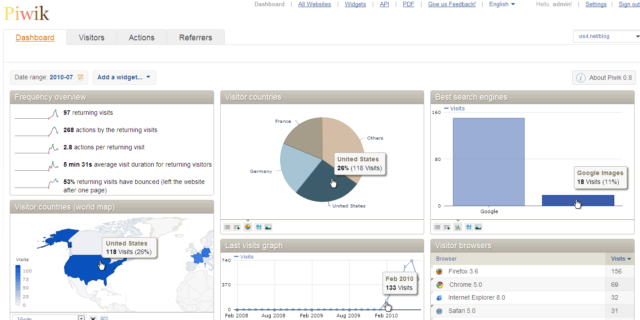Piwik displays reports regarding the geographic location of visits, the source of visits (i.e. whether they came from a website, directly, or something else), the technical capabilities of visitors (browser, screen size, operating system, etc.), what the visitors did (pages they viewed, actions they took, how they left), the time of visits and more.
In addition to these reports, Piwik provides other features for analysis of the data it accumulates, such as:
- Annotations — the ability to save notes (such as one’s analysis of data) and attach them to dates in the past
- Transitions — a feature similar to Click path-like features that allows one to see how visitors navigate a website, but different in that it only displays navigation information for one page at a time
- Goals — the ability to set goals for actions it is desired for visitors to take (such as visiting a page or buying a product). Piwik will track how many visits result in those actions being taken
- E-commerce — the ability to track if and how much people spend on a website
- Page Overlay — a feature that displays analytics data overlaid on top of a website
- Row Evolution — a feature that displays how metrics change over time within a report
- Custom Variables — the ability to attach data, like a user name, to visit data
Piwik also provides features that are not directly related to analyzing web traffic, including:
- Privacy Options — the ability to anonymize IP addresses, purge tracking data regularly (but not report data), opt-out support and Do Not Track support. In Germany, 13% of .de websites use Piwik because of these options.
- Scheduled Reports — reports sent regularly by e-mail or text message
- Log Importing — a script is also provided that imports data from web server logs
- the API — every report is accessible through a web API as well as almost every administrative function, and programs can be created to use this API
- the Mobile App — a free mobile app is provided so users can access their analytics data on their phone
Piwik can also be integrated with third-party apps including CMSes such as WordPress or Drupal, E-Commerce apps such as Magento or PrestaShop, bulletin board systems such as phpBB, and more.
The Piwik community has also created several plugins that can be used to augment Piwik. There are currently 58 third-party plugins.

